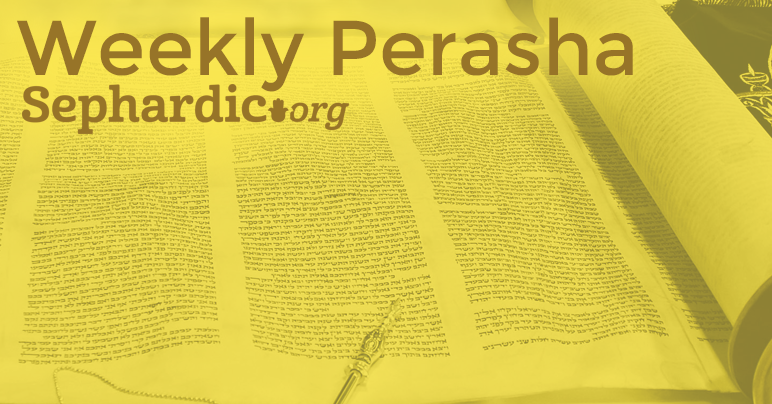
KEDOSHIM - JUDGING FAVORABLY AND ITS SPIRITUAL CONSEQUENCES
We know that the Judges of Israel are required to treat contending parties equally during court proceedings. This requirement is learned from the concluding words of a verse in our parasha "In righteousness you shall judge your people."1 The Talmud 2 also derives from here that one is obligated to give his neighbor (friend) the benefit of the doubt. Rashi asserts that included in the sense of the precept is that all Jews are duty bound to judge their fellow favorably toward the side of merit. 3 The apparent reason for the favorable judgement of others is to increase peace and friendship amongst the people - while an unfavorable one would increase discord. The latter is a private judgment made by any member of Israel which is basically rendered for or against an individual or group as regards to their service of Hashem. Instead of a parallel requirement to the law for Judges that there be parity amongst parties ; the law here for the populace already requires an exclusive beneficial verdict of the Judge. We also assert that a judgement rendered by an individual member of the nation for or against another member will cause a parallel judgement in the heavenly court above. And in this instance the Torah mandates one not to hang in judgement by weighing through the evidence - but rather he must look at the evidence and figure out a way to acquit.
THOSE ABOVE ARE WAITING FOR A FAVORABLE JUDGEMENT BELOW
Very often we are placed in situations requiring us to render a verdict concerning someone else's service of Hashem. While Torah law requires man to judge his friend favorably, the Tanna R. Yehoshua Ben Perahya suggests 4 one to judge all men (even those not known to be righteous) favorably or towards the scales of merit. Why is one here below in this earthly abode given an opportunity to render judgement on another peer? Why isn't this reserved for those courts in the spiritual worlds above? The answer can possibly be found in an aggadic narrative found in the Talmud. 5 Rabbah Bar Shila once inquired of Eliyahu Hanavi as to what Hakadosh Barukh Hu was doing at that time? Eliyahu replied that he was reciting the teachings of all the Sages with the exception of those of R. Meir. For the latter learned them from the mouth of Elisha Ben Avuya or Aher. Rabbah Bar Shila retorted that R. Me'ir treated the teachings as a pomegranate - eating only its inside and discarding the peal! At that instance - Eliyahu testified that ( HBH has heard your verdict concerning R. Meir) and has begun to cite his teachings... R. Meir my son says... We see from here that there was no testament on earth below exonerating R. Meir until Rabbah Bar Shila had rendered a favorable judgement! Once that was done - the heavenly court above followed accordingly - acquiescing to the ruling below. The spiritual ramifications are astonishing; it behooves us therefore to give man the benefit of the doubt in order to grant him a positive verdict from above.
WE ARE ACTUALLY OUR OWN JUDGES OF OUR ACTIONS
The Baal Shem Tov reveals a tremendous secret concealed in a statement attributed to R. Akiva from Pirke Avot 6 "Retribution is exacted from a person with his knowledge" - that is to say that each person is asked to render a judgement on his own actions. "And even so without his knowledge" - that is - he knows not that the judgement before him is his own. R. Nahman of Breslov explains 7 this teaching of his great grandfather. For I heard in the name of the Baal Shem Tov. Before any decree is passed against the world God forbid, the whole world is gathered and asked if they concur with that judgment. Or the person himself against whom judgment has been decreed God forbid - even he is asked whether he concurs, And thus the judgment is concluded. This apparently means that when a decree is passed against many people all involved are asked if they concur. When a decree is passed against an individual he alone is asked. Apparently, if he was specifically asked about himself he would certainly protest and say that the judgment is not so. However, he is misled. He is asked about a case similar to his own, and he passes judgment. In this way the judgment is concluded. King David purposely sent Uri'ah to the battlefront where he was killed and took Bat Sheva for a wife. In order to obtain a verdict for or against David in the heavenly court - Natan the prophet was sent to King David to obtain his decision on the matter. 8 This is keeping within the teaching of R. Akiva that retribution is exacted from a person only after consulting the one on trial for his verdict. Hence R. Natan guised the case through an allegory. As R. Akiva taught - he renders a decision without realizing he is actually judging himself. There were two people in a certain town, one wealthy and one poor. The wealthy man had large herds of cattle and flocks of sheep. The poor man possessed only one small lamb. It once happened that a guest arrived at the wealthy man's house. Because he could not bear taking from his own flock, the wealthy man went to the house of the poor man. He proceeded to take away his only lamb, slaughter it and feed his guest. We are then told of the judgement. David was very indignant about this man. And he said to Natan "As Hashem lives ! Any man who does this deserves to die! And he must pay fourfold for the lamb - for he did this deed and had no pity. 9 Natan than revealed to David - "You are that man!! 10 Natan then informed King David that he himself was this wealthy man, for David had many wives. Uri'ah, on the other hand was the poor man and Bat Sheva his only lamb. The precise verdict which David issued was to be carried out against himself; he was to pay a fourfold payment and be put to death by the sword. King David repented and the decree of death was rescinded. He was however forced to pay through the suffering he experienced from from four of his children; Amnon, Tamar, Avshalom and the first infant that Bat Sheva bore him. King David had obviously been unaware that he was passing judgment on himself until he was informed of this by the prophet. 11
PUSHING OURSELVES TO GIVE A FAVORABLE VERDICT
One has to be extremely careful in order to pass a favorable judgement upon an unknown man's deeds and certainly upon one who is generally upright. He must be very diligent in searching and finding a way to grant him the benefit of the doubt. 12 I heard from R. B. Rosenblum 13 in the name of R. Pinhas Menahem Alter of Gur a beautiful explanation of the term Kaf Zekhut - Scale of Merit. The term Kaf can be understood in terms of a Kaf Na'Alayim or Shoe Horn. Though it is difficult to always find the benefit of a doubt - we must attempt to squeeze evidence into place as one must squeeze an oversized foot into place via the shoe horn. For when the heavenly court gives us an opportunity to redeem ourselves - let us make the right decision - We must go beyond reasonable doubt making sure always to acquit as one would wiggle ones foot into a tight fitting shoe.
Shabbat Shalom








